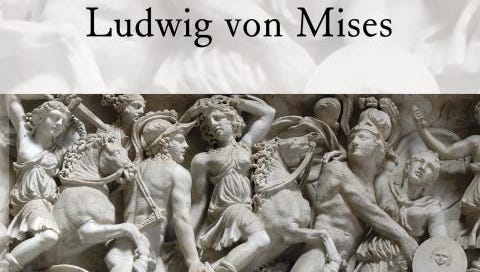By J.W. Rich
In his 1922 work, Socialism, Ludwig von Mises unleashed a 600-page assault against the ideology of socialism. The classical liberalism that he championed had all but disappeared from the intellectual scene, and the allure of socialism held the scholars and professors of Europe in rapture. Mises was not content to mildly critique socialism or express a weak preference for an alternative system. Instead, he argued that a successful socialist system is not just impractical or inefficient, but impossible. The most famous argument he used to advance his case is the Economic Calculation Problem, which suggests that the planners of a socialist economy have no way of efficiently allocating resources. This claim of the impossibility of a socialist economy is strong enough in its own right, but Mises makes an even stronger claim as well. Not only is a socialist economy impossible, but even a socialist society is impossible as well. Properly speaking, a socialist society cannot exist.
In order to understand this surprising claim, we must first establish the basic facts of society – what it is and how it comes about. Mises writes:
Society is co-operation; it is community in action.
To say that Society is an organism, means that society is division of labor. To do justice to this idea we must take into account all the aims which men set themselves and the means by which these are to be attained. It includes every inter-relation of thinking and willing man. Modern man is a social being, not only as one whose material needs could not be supplied in isolated, but also as one who has achieved a development of reason and of the perceptive faculty that would have been impossible except within society. (Socialism, 292)
In Mises’ view, society is a product of the interactions individuals have with each other. The ultimate expression of these interactions is the division of labor. In man’s primitive form, he is a self-sustaining creature. Everything that he needs – food, shelter, clothing, and more – are all produced solely by himself. However, when man instead specializes particular production processes and exchanges his goods with those who do likewise, he can attain standards of living that we previously inaccessible to him. This has obvious economic implications, but it has important social implications as well. A family or tribe can be formed through the interactions we have with the people we know, but these limited interactions do not create a society. In order to reach a higher level of social organization, it requires interactions with people we don’t know. Trade and exchange through the division of labor is exactly how we achieve this:
The greater productivity of work under the division of labor is a unifying influence. It leads mean to regard each other as comrades in a joint struggle for welfare, rather than as competitors in a struggle for existence. It makes friends out of enemies, peace out of war, society out of individuals. (Socialism 294-295)
We can see how the division of labor leads to the creation of society, but what exactly leads to the division of labor? What is the root cause that prompts us to social organization in the first place? Mises gives us an answer:
Society is the product of thought and will. It does not exist outside thought and will. Its being lies within man, not in the outer world. It is projected from within outwards. (Socialism 291)
Society is not something that man falls into accidently, without any intentionality. It is a product of man and the conscious utilization of reason. Man adopts the division of labor because he recognizes it to be more productive than individual autarky, and engages in society because of the benefits that social bonds relay to him. Furthermore, society does not just simply exist, being maintained on auto-pilot, so to speak. Rather, it is purposefully sustained because those that live within it continue to benefit from its existence. If this were ever not the case, then the social bonds and large-scale communities that thrive all around us now would immediately vanish.
To more fully understand and contextualize these aspects of society, Mises makes a distinction between two different types of systems: organization and organism. To due him full justice, I will quote him at length:
Organism and organization are as different from each other as life is from a machine, as a flower which is natural from one which is artificial. In the natural plant each cell lives its own life for itself while functioning reciprocally with the others. What we call living is just this self-existence and self-maintenance. In the artificial plant the separate parts are members of the whole only as far as the will of he who united them, has been effective. Only to the extent to which this will is effect are the parts within the organization inter-related. Each part occupies only the place given to it, and leaves that place, so to speak, only on instructions. Within this framework the parts can live, that is, exist for themselves, only in so far as the creator has put them alive into his creation…Human organization is no different. Like society, it is a product of will. But in this case the will no more produces a living social organism than the flower-maker produces a living rose. The organization golds together as longas the creating will is effective, no longer. The parts which compose the organization merge into the whole so far as the will of the creating will is effective, no longer…Organization is an association based on authority, organism is mutuality. (Socialism 295-296)
Mises then concludes:
To seek to organize society is just as crazy as it would be to tear a living plant to bits in order to make a new one out of the dead parts. An organization of mankind can only be conceived after the living social organism has been killed. The collectivist movements are therefore fore-doomed to failure. It may be possible to create an organization embracing all mankind. But this would always be merely an organization, side by side with which social life would continue. It could be altered and destroyed by the forces of social life, and it certainly would be destroyed from the moment it tried to rebel against these forces. To make Collectivism a fact one must first kill all social life, then build up the collectivist state. (Socialism 296-297)
Mises views an organism as a system of interactions that perpetuates itself based on the self-interest of all its parts. The individual parts are not told where to go or what to do to maintain the greater system, but rather, the system is sustained because it individually benefits them to do so. No one forces them to coalesce or unify, but they all independently recognize they are better off together rather than separated.
In contrast, organization is a system created as a result of a single will. Each piece of the system is ordered to perform their task at a certain place and a certain time. These individual parts have no will of their own, but are slaves to the will of the organizer. This organizer creates the organization and perpetuates it through himself. If at any point he neglects it, the organization falls apart. The apt metaphor that Mises uses for these two types of systems is the organism of the flower versus the organization of the artificial flower. The flower is held together by all of its natural parts working together for their own betterment. The artificial flower is held together only by the adhesive that keeps it in place.
The distinction between organism and organization is crucial for our understanding of human society. As Mises states, society is an organism. It is held together by each of its parts all working in concert for their own benefit. Just as there is no flower-dictator that commands each part of the flower to stay together, there is no social-dictator that commands each part of society to stay together. They all do so of their own volition and their free will. We have seen how society is a product of man pursuing the division of labor through the application of his own reason, but there is a vital quality this pursuit must have: it must be voluntary. Each member of the social organism must be free to participate within it as they see fit. Man must be free to seek the social bonds that he desires and not coerced into doing so. This aspect of free choice is not optional, but the defining feature of a social order.
Society is an organism, but the collectivist ideologies do not view it as such. They view society instead as being an organization, open to their control and influence. For the socialists to achieve their goals of social transformation, they must seat themselves as the driving will of society. Once this is achieved, they will then be free to reorganize and transfigure society into the image they see as right and just. This entire framework of thinking is thoroughly infested with the idea of organization, that society can be manipulated from above like a potter molds his clay. The socialist could not be more wrong. As Mises said above, “To seek to organize society is just as crazy as it would be to tear a living plant to bits in order to make a new one out of the dead parts.” Where order is imposed down from above, there are no social bonds. Under a regime of force, there can be no mutuality, fraternity, or liberty. As such, there can be no society either.
In the socialists’ pursuits to create their utopian fantasy, they would have to destroy society in the process. They would pluck apart each piece of the social flower, and try desperately to assemble it all back together according to their own designs. But anyone could see that the organism of the flower has been destroyed, and all that is left is the hollow organization they have created. What makes a society is not the buildings, roads, marketplaces, or neighborhoods that it builds, but the voluntary interactions that take place within them. Where men are not free, society has vanished and only the dreary bureaucratic organization remains. No matter how you re-arrange all of the stuff, the social bonds have been irreparably broken.
The socialists are unable to create a society. They can create a structured, ordered organization that might resemble society, but it still will never be the genuine article. The best they can accomplish is an artificial and pitiful imitation. The collectivist mindset, solely focused on the organization paradigm, will only accomplish the destruction of social bonds and their replacement with an ersatz community. As such, any collectivist scheme is predestined to fail. Their goals of creating and morphing an equal, just, and fair society will never come to fruition because they are unable to create any society at all. Just as the economic planners cannot plan an economy, the social planners cannot plan a society. It is not improbable, unlikely, or unrealistic, but completely and utterly impossible.
In order for society to advance, for it to grow and flourish, the collectivist model of organization must be rejected. In its stead, the organism of society must be embraced. The voluntary and free interactions of men should be encouraged, and the spontaneous order of society recognized. For all the proponents of society, for its allies and those that wish to preserve it, there is no other alternative.
Read More by J.W. Rich:
thejwrich.medium.com
Discover New Opportunities
Click here for the Austrian Economics Discord Server.
Click here for the Austrian Economics Discord YouTube Channel.
Click here to get your very own “Swolerno” premium T-shirt for only 25 smackers! Available in 3 different colors.





